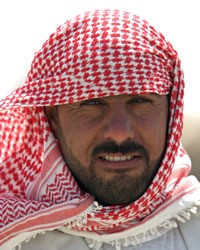Arab, North Iraqi in Iraq

Photo Source:
National Archives
Creative Commons
|
Send Joshua Project a map of this people group.
|
| People Name: | Arab, North Iraqi |
| Country: | Iraq |
| 10/40 Window: | Yes |
| Population: | 10,988,000 |
| World Population: | 12,119,600 |
| Primary Language: | Arabic, North Mesopotamian |
| Primary Religion: | Islam |
| Christian Adherents: | 0.70 % |
| Evangelicals: | 0.20 % |
| Scripture: | New Testament |
| Ministry Resources: | Yes |
| Jesus Film: | Yes |
| Audio Recordings: | Yes |
| People Cluster: | Arab, Levant |
| Affinity Bloc: | Arab World |
| Progress Level: |
|
Introduction / History
Iraq was home to some of the oldest civilizations known to man. This land was part of what was known as the Fertile Crescent where agriculture and trade flourished. It was the place where some of the early developments of Western civilization began; the invention of the wheel, the planting of the first cereal crops, the development of mathematics, astronomy, etc. Babylon was a state in Lower Mesopotamia was founded by a powerful Amorite king by the name of Sumuabum in 1894 BC. One of the Amorite dynasties was established in city state of Babylon which would eventually emerge as the first Babylonian empire. A later Babylon Empire was noted for it's moral evil, but also its great flourishing in economics, agricultural production, architectural projects, the arts, and science. During the early days of the spread of Islam and Arab civilization, Iraq became Arabized and Muslim. It was at that point that one could say the people living there were "Arabs," though the Kurds remained separate. Baghdad, the capital of Iraq, was an important center for trade during the "Golden Age of Islam," the 9th and 10th centuries. It remained a world class city for hundreds of years despite being destroyed by the Mongols in 1258 and later by the Turks in 1401 when it fell under the rule of the Ottoman Empire. It remained part of the Ottoman Empire until the 20th century when it fell under the control of the British. Iraq officially gained her independence in 1932.
What Are Their Lives Like?
Since the ousting of Saddam Hussein in 2003, Iraq has been in a state of turmoil. Commonly, the three main groups, Sunni Muslim Arabs, Shia Muslim Arabs and Kurds have managed to take over one another's homelands, sometimes bulldozing homes and driving their rivals to becoming Internally Displace Persons (IPPs), or refugees outside their country. Since there is very little willingness to share power for the common good, Iraqi Arabs will face poverty and misery for years to come.
What Are Their Beliefs?
Islam has greatly influenced the lives of the Iraqi Arabs. Most are either Sunni or Shia Muslim, the latter being unusual for Arabs. There has been great strife between the Sunni and Shia Muslims for political control for many years. The Shias are allied with their religious counterparts over the border in Iran. They are in the category of the "Twelvers," meaning they follow 12 imams (teachers), the 12th being Muhammad ibn al-Hasan, whom they believe will someday return to bring peace and justice to the world. Shia Muslims also stress victimhood and martyrdom, and they commemorate events where their leaders were killed. The latter might be a possible bridge to the death of Christ on the cross. There are also some traditional Christians among the Iraqi Arabs.
What Are Their Needs?
Iraqi Arabs need peace in their land. They need a situation of cooperation so they can rebuild their nation and their industries.
Prayer Points
Pray for peace and justice in Baghdad and Iraq in general. Pray for the Iraqi Arabs to have the willingness to cooperate with all factors, allowing their country to rebuild. Pray for a spiritual hunger that will lead Iraqi Muslims to Jesus Christ as the answer to their spiritual needs. Pray for an unstoppable movement to Christ among Iraqi Arabs.